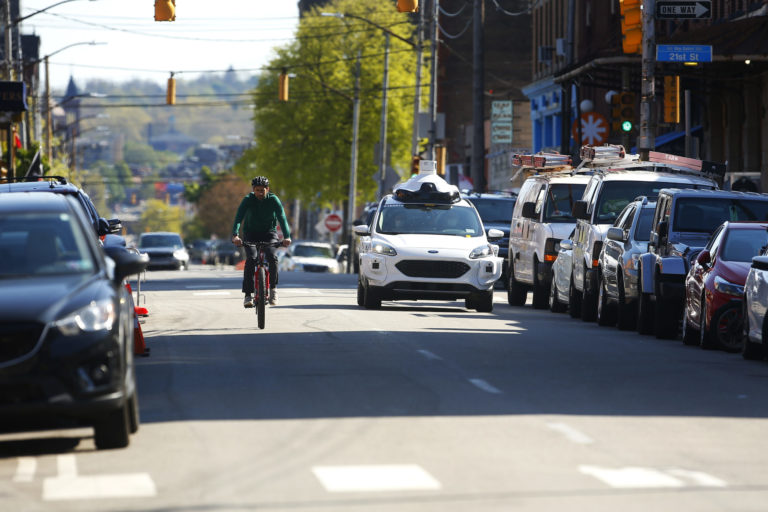How will self-driving cars interact with bikers, some of the most exposed travelers on public roads?
Autonomous vehicle company Argo AI hopes to answer that question with the release of new safety and technical guidelines around its vehicles’ interactions with cyclists, developed alongside the League of American Bicyclists (LAB). The focus on safety among cyclist interactions as opposed to merely overall safety shows a commitment from the company to integrate its tech with existing transportation options in cities.
“Argo AI is focused on developing self-driving technology that makes cities safer for everyone — in particular cyclists and other vulnerable road users,” said Peter Rander, president and cofounder of Argo AI, in a press release. “These technical guidelines deliver on our commitment to developing a self-driving system that is trusted by cyclists and enhances the safety of the communities in which we operate.”
Argo’s collaboration with the league is important news for Pittsburgh, where biking accessibility is a hot button issue on the narrow winding streets of the city. Just last month, a cyclist died in a vehicle collision in Highland Park.
But cyclist mortality is a global issue, too. The World Health Organization reported that an estimated 41,000 cyclists die every year in traffic accidents. There are signs the problem is worsening in the United States: The National Highway Traffic Safety Administration found that the fatality rate of cyclists in traffic accidents rose 5% from 2019 in 2020.
Both safety and perception of safety are essential to Argo's go-to-market strategy: Without public trust, customers for the highly disruptive tech will be limited.
For Argo and other companies in the AV industry, ensuring that the tech is not only safe but that the public actually perceives it to be safe is perhaps the most important part of its go-to-market strategy. Without public trust, customers for the highly disruptive tech will be limited, as evidenced by a recent report on the issue done by fellow AV company Motional.
Argo’s new guidelines encompass six key philosophies on how autonomous vehicle systems should interact with cyclists, including making them a distinct object class, mapping of local cycling and infrastructure laws, and continuous testing of cyclist scenarios. With the help of the LAB and consulting bicyclists, the guidelines will help Argo to prepare its vehicles for typical and atypical behaviors while sharing the roads with bicycles.
“Argo AI and the League of American Bicyclists share a common goal to improve the safety of streets for all road users,” LAB Policy Director Ken McLeod said. “We appreciate Argo’s proactive approach to researching, developing, and testing for the safety of people outside of vehicles. Roads have gotten significantly less safe for people outside of vehicles in the last decade, and by addressing interactions with bicyclists now, Argo is demonstrating a commitment to the role of automated technology in reversing that deadly trend.”
Though not a new product launch or major company announcement, the release of these safety specifications are a sign that Argo is not only looking to grow consumer trust, but potentially preparing to address safety concerns from investors ahead of a highly anticipated public offering in the next year. Already there have been signs that the company is making progress towards its goal of a successful IPO, through a new delivery partnership with Walmart to a commercial pilot program of its self-driving cars with Ford and Lyft in Miami this year.
Still, while some expected the company to announce more detailed plans by the end of 2021, Argo remains tight-lipped about when exactly it will go public. Once it does though, it will be the second of Pittsburgh’s robust autonomous vehicle sector to put its tech to the test on the market, and one of many companies making public moves this year.
Sophie Burkholder is a 2021-2022 corps member for Report for America, an initiative of The Groundtruth Project that pairs young journalists with local newsrooms. This position is supported by the Heinz Endowments.Before you go...
Please consider supporting Technical.ly to keep our independent journalism strong. Unlike most business-focused media outlets, we don’t have a paywall. Instead, we count on your personal and organizational support.
Join our growing Slack community
Join 5,000 tech professionals and entrepreneurs in our community Slack today!

The man charged in the UnitedHealthcare CEO shooting had a ton of tech connections

The billion-dollar creator industry hits Pittsburgh — and disrupts the innovation economy

From rejection to innovation: How I built a tool to beat AI hiring algorithms at their own game


